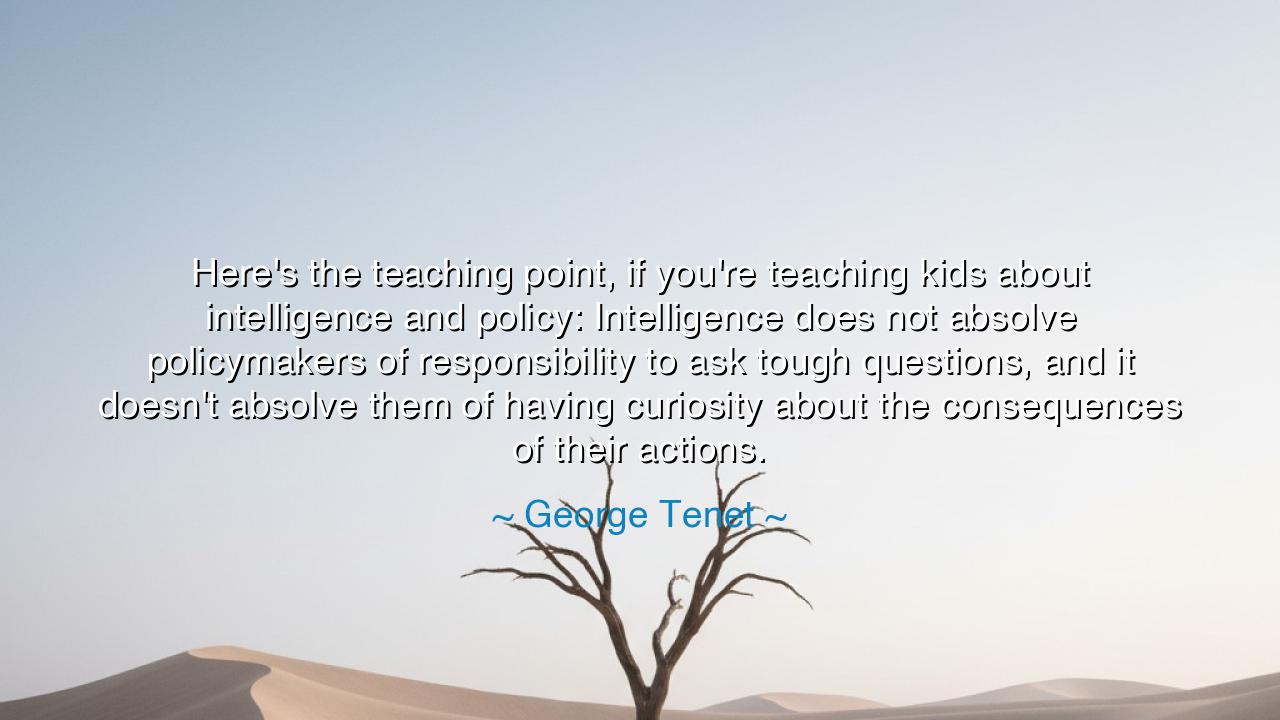
Here's the teaching point, if you're teaching kids about
Here's the teaching point, if you're teaching kids about intelligence and policy: Intelligence does not absolve policymakers of responsibility to ask tough questions, and it doesn't absolve them of having curiosity about the consequences of their actions.






In an age of secrets and shadows, when empires rise and fall upon the weight of information, there spoke a man seasoned by the fires of consequence — George Tenet, once the guardian of intelligence at the heart of nations. He declared, “Here’s the teaching point, if you’re teaching kids about intelligence and policy: Intelligence does not absolve policymakers of responsibility to ask tough questions, and it doesn’t absolve them of having curiosity about the consequences of their actions.” In these words lies a truth older than politics and deeper than war — that knowledge without wisdom is a danger, and that no counsel, no data, no intelligence can replace the sacred duty of human judgment.
Tenet’s wisdom is born from the crucible of experience, forged in a time when intelligence — that web of secrets and signals — held the power to steer nations toward peace or destruction. His teaching is not only for the halls of government but for all who wield influence, for all who act upon information that affects others. He reminds us that intelligence, however vast, is not a shield against error. The one who governs, the one who decides, must remain curious, must dare to ask the hard questions, must look beyond the surface of reports to the soul of the matter — to the moral cost, the human toll, the unseen ripples of every decision.
In the chronicles of history, we find the echo of his warning. When the oracles of Delphi spoke to the kings of Greece, their words were veiled in riddles, and yet many rulers took them as final truth. Croesus, king of Lydia, heard the oracle say, “If you cross the river, a great empire will fall.” Thinking himself destined for victory, he went to war — and it was his own empire that perished. So too in modern times, men in power mistake intelligence for infallibility. They forget that wisdom lies not in the message received but in the mind that questions it. To follow intelligence blindly is to walk with open eyes into the abyss.
Tenet’s call is therefore a call to moral courage — the courage to doubt, to question even those truths that seem certain, and to demand not just facts, but understanding. For curiosity is not a weakness; it is the mark of true leadership. When a ruler ceases to be curious about the consequences of their actions, they cease to be a servant of the people and become instead a prisoner of their own certainty. A question unasked may one day become a life undone.
Consider the story of Emperor Ashoka, who waged war upon Kalinga and conquered it in triumph. The intelligence he gathered was flawless: his armies were strong, his strategy sound, his victory assured. But when he walked among the ruins and saw the weeping of mothers and the silence of the dead, he asked the question he had never asked before — “What have I done?” That question changed the course of his life and his empire. From that moment, Ashoka renounced conquest and became a ruler of peace. His greatness began not with knowledge, but with the curiosity to confront the consequences of his own choices.
Thus, George Tenet’s words become a teaching for all generations: to govern wisely is to remain a student forever. Power must not dull the edge of inquiry. Information, no matter how refined, must never replace reflection. The wise leader gathers intelligence not to silence their doubts, but to sharpen them. The truly intelligent policymaker does not seek certainty, but clarity — and understands that every decision carries a weight that reason alone cannot bear.
Let this be the lesson, then, for the children of the future: Never let knowledge make you arrogant, nor certainty make you blind. Ask questions even when it is inconvenient; be curious even when others are content. Intelligence is a tool, but conscience is the guide. When the two walk hand in hand, justice is possible; when they part, ruin follows swiftly. So act with awareness. Think deeply. And remember, the wisest among us are not those who know the most — but those who never cease to ask, “What will this mean for the world I leave behind?”






AAdministratorAdministrator
Welcome, honored guests. Please leave a comment, we will respond soon